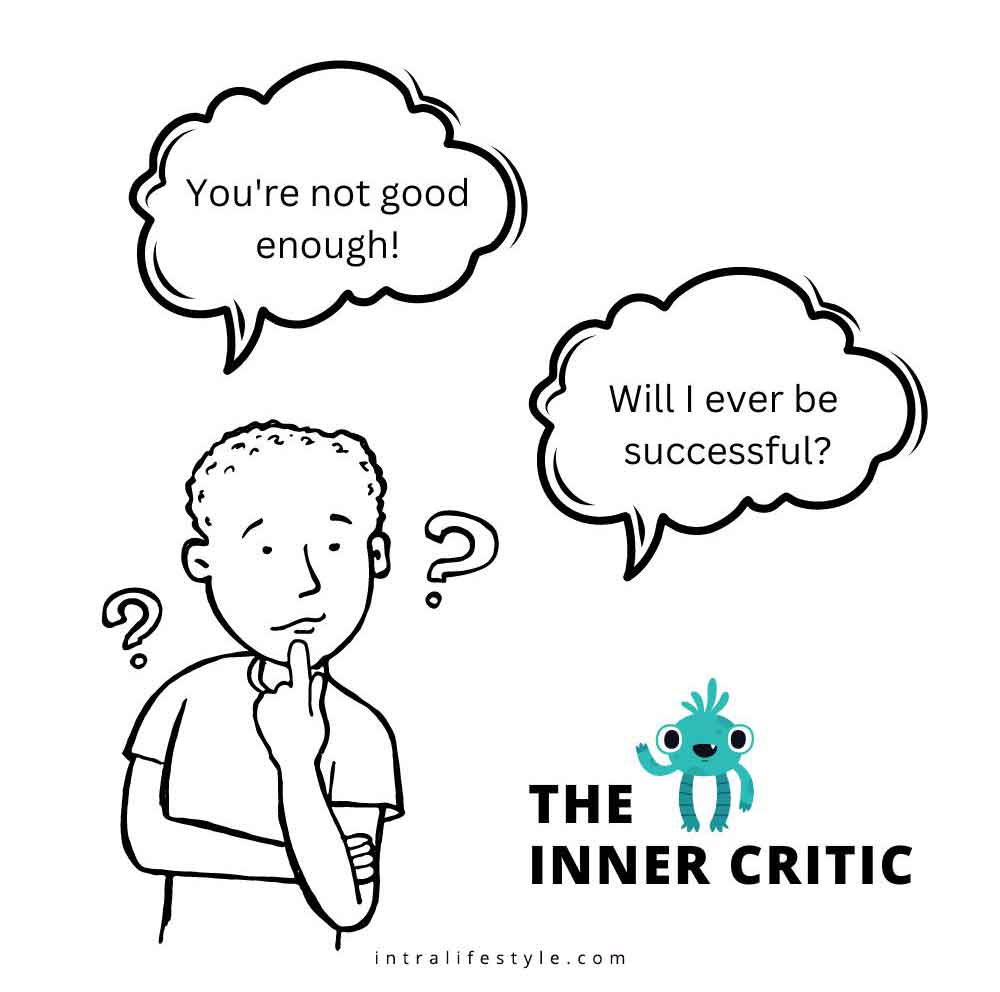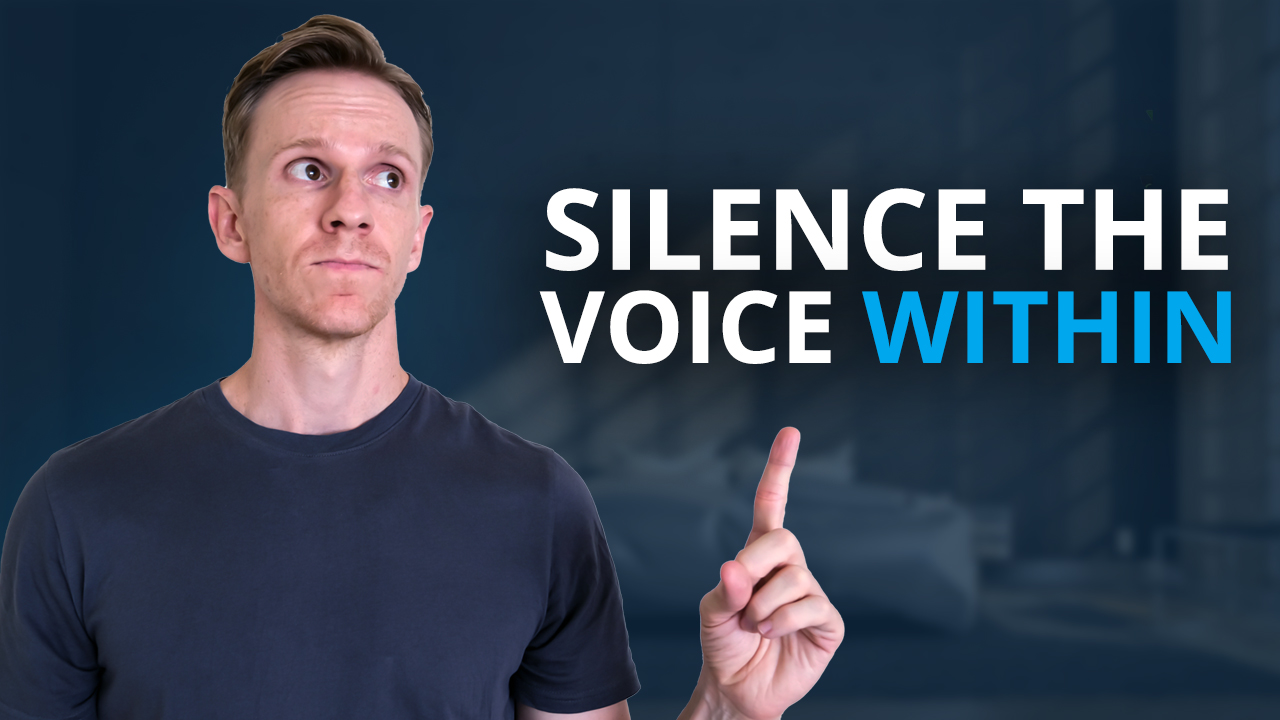We've all been there. Stuck in our heads, constantly criticizing ourselves and holding ourselves back from reaching our full potential. But what if I told you, there's a way to silence that inner critic and finally break free from self-doubt?
We're going to explore the inner critic and how you can live life with a deeper sense of inner peace and happiness.
Watch Video Version:
What is the role of the inner critic?
First, let's define what the inner critic is. The inner critic is the voice in our head that can be negative, judgmental, and critical. It can tell us that we're not good enough, that we'll never be successful, or that we're not worthy of love and happiness. This voice can be so loud and persistent that it can be hard to ignore. I’m guessing you know what I’m talking about, right?
The inner critic can take on many different forms and characteristics. It can be a harsh and critical parent, a perfectionist, or a voice that compares us to others. Additionally, it can be triggered by failure, rejection, or unmet expectations.
The inner critic can have a powerful impact on our thoughts, emotions, and behaviour. It can make us doubt ourselves, hold us back from taking action, and can lead to feelings of anxiety, depression, and low self-esteem.
Common triggers of the inner critic

Failure or rejection.
When we experience failure or rejection, our inner critic may tell us that we're not good enough or that we'll never be successful. This can make it hard for us to bounce back and try again.
Comparing ourselves to others.
Our inner critic may tell us that we'll never be as successful or as happy as others. This can lead to feelings of inadequacy and can make it hard for us to appreciate our unique strengths and accomplishments.
Perfectionism
When we have high expectations for ourselves and others, our inner critic may tell us that we're not good enough if we don't reach those expectations. This can lead to feelings of disappointment and frustration.
Unmet expectations
When we have set expectations for ourselves and others and they're not met, our inner critic may tell us that we're not good enough or that we'll never be successful. This can lead to feelings of disappointment and frustration.
Steps to overcome your inner critic
Step 1: Self-Awareness
Remember, that you are not your thoughts. Bringing awareness to the situation from a place of curiosity will relieve some of the pressure. Ask yourself questions. Why do I feel this way? Where are these thoughts coming from? What am I making this mean? Could there be another possibility here?
Oftentimes, we get stuck in our heads and believe every thought we have. Become the observer of your thoughts.
Step 2: Reframing
Once you’re aware, it’s time to reframe. Reframe simply means to shift the perspective. In this instance, we’re talking about switching them from negative to positive. The inner critic will attack you in many ways as we’ve discussed, so it’s important to truly challenge it by reframing and shining the light elsewhere.
Step 3: Befriend
Many people want to avoid the inner critic because of the trouble it causes. Believe it or not, your inner critic serves a purpose. It’s trying to protect you. Let’s say that you have the perfectionist voice telling you, “it’s not quite good enough yet”. Consider that at some point in your past (probably multiple times), you were made to feel as though whatever you were doing wasn’t good enough. Because of this, your inner critic is reminding you in an attempt to keep you safe and comfortable.
Step 4: Show compassion and empathy to that part of you
From this new perspective, you will be able to have a new sense of self-compassion and empathy for your inner critic. It’s about integrating the whole part of you. Doing this will enable you to work through some of the baggage and find a deeper sense of inner peace.
Step 5: Look for evidence of the opposite
Naturally, we tend to be drawn to the negative. If 50 people gave you an opinion on what they thought of you and 49 of them had something nice to say, you’d still focus on the 1 who didn’t. It’s important to seek the opposite in these situations. In other words, whatever you’re focused on that doesn’t feel good, switch your focus to something else. More specifically, look for the exact opposite of what you’re focusing on. If you look hard enough, you will see it.
Step 6: Practice self-gratitude
Gratitude will change your life. It further draws your focus to a feeling-good place. Being grateful is about recognizing and appreciating the things that you have. It switches your attention to receiving energy, rather than noticing what you don’t have. And about your inner critic - let’s say that you’re focused on what’s missing too often. Instead, how about focusing your attention on all the great things that you do have in yourself and your life?
Silencing your inner critic
Hopefully, you can recognize that your inner critic isn’t an enemy. It’s about finding peace and gratitude for it, knowing that it wants to help you. Of course, it may be holding you back, but for good reason. When you develop a deeper awareness around it and your entire being, you can begin to become less emotionally involved with it. Not believing everything it says but being able to understand it. This is how you silence your inner critic. When we simply try to avoid, get rid of, or become overwhelmed, it gets hard to move past.

